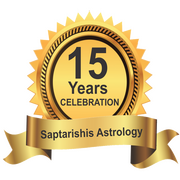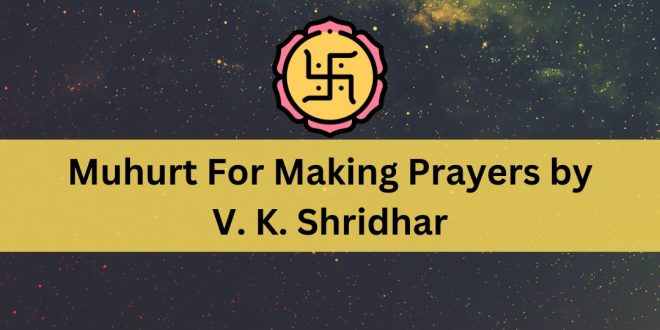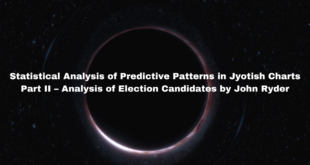Related Articles
In Hindu religion and mythology prayer to the deities has significant role and our holy books, canonical treatises, scriptures have plethora of references where the God has blessed the devotees with the “Vardaanas” sought by them. The chief purpose of Yagna, Tapa, Karamkaand, Mantras, Pooja, Aartis, Daan etc. is to seek blessing from the God. The God blesses the devotes when “Prayers” are made to Him. Not only ordinary mortals but the Siddha Rishis also know the strength of the prayers, perhaps prayer has that strength which no other known spiritual activity can attain.
Now, the pertinent question is as to when make prayers so as to attain Siddhi or receive the best blessings from the almighty. Perhaps only the Muhurt branch of Indian astrology can provide guidance in the matter which has withstood the test of time for the last millenniums. Our Trikaal Darshi Rishis had found the most suitable time for performing Yagnas, as it was observed that Ahutis offered during certain moments were not accepted by the God ¾this gave birth to Muhurt branch of knowledge, and from which astrology emanated.
The primary application of this knowledge in Karamkand & propitiations was latter developed as full-fledged knowledge of Muhurt; from which predictive and other branches of astrology emanated latter on.
Muhurtas for making prayers have not been specifically prescribed in the Muhurt treatises. Prayers for fulfillment of desires or Siddhis are made in the rituals like Yagna, Havan, Karamkaand, Daan etc. Prayers are integral part of these rituals; and for this Muhurt prescribed for the rituals supersede the Muhurt requirements of these prayers. Dictums also prescribe performing Poojas and reciting of various Mantras and Aartis as daily routines.
Prayers are in-built in those Aartis, Chaalisas and Mantras etc. No specific Muhurtas are required for daily Poojas, however, Brahma Muhurt, morning and evening twilights, Amrit-Ghatis of Nakshatras& weekdays are held as the most fruitful times. One may select such Poojas based on type of attainments mentioned in the specific recitations.
The above is widely known, and the readers want the most appropriate and fruitful time, that their specific prayers made during that time, fulfill their desires and Siddhis are attained. In fact, initiating any activity on a selected time without making prayer or thinking of success in the venture is not thought possible. Like in Pooja Paddhati for Griha Pravesh (house warming) ceremony, prayers are in-built in Poojas of specific deities by incantation of the prescribed Mantras. If an activity is initiated during its selected Muhurt but no prayer is sought for success in the undertaking at that time or contrary thought prevails in the mind, Muhurt shall not fully fructify. Like success shall always be wanting to a warrior who while initiating an activity for war, neither makes any prayer for his success but thinks of his defeat or death at that moment. Thus prayer is integral part of the initiation of an activity at the selected moment of Muhurt, to achieve success in the activity.
Now distinction has to be made between Muhurt for imitation of a life-activity and Muhurt for making prayer only; when the related activity is yet to be started or for seeking general success in life-ventures like seeking blessings for wealth, children, education, success,victory etc. etc. This aspect shall be discussed here-in-after.
The treatises on Muhurt have laid down general principles for selection of Muhurtas of various life-activities and the subject Muhurt can be derived from those principles. According to Hindu mythology different deities bless specific blessings: like Goddess Lakshamai blesses wealth, Goddess Sraswati blesses education however our Tridevtas shower all types of blessings. These deities are tutelary lords of different Nakashtras and Tithis. Similarly there are tutelary lords and Adhi-devtasof weekdays, Karanas& Yogas ¾Panchanga elements. Rulerships of planets, signs, and their sub-divisions are also known. Karak planets and Dik-palashave also been described. Poojas of different deities are performed during Tithis ruled by them. Specific deities are strong during the Tithis and Nakshatras etc. ruled by them; in addition to their birth Tithis when festive occasions are celebrated. Therefore, select the Panchanga elements ruled by the specific deity which blesses/controls specific blessings. Select Shukla Paksha (bright half) and Uttrayana, which corresponds to day-time of the Devtas. Night-time of Devtasand Devshyana periods must be shunned. When a specific Panchanga element is not available then another element may be selected whose tutelary lord has harmonious relations with the tutelary lord under consideration. These are the general principles of selection of Panchanga elements of Muhurt; described very-very briefly.
Specific deities are strong in bestowing the best blessing during certain periods which generally correspond to festive periods like Nav-Ratris for seeking blessing of Maa Durga, Ganesh Chaturthi for seeking blessings from Lord Ganesh and the like. These are held as the best periods of Poojas, and seeking Theirblessings through prayers. ‘Big-festival’ (Mahotsavas) occasions are held as fruitful Muhurtas in general, and thus for making Poojas, & prayers of wide varieties.
For selection of proper time of making prayer one must consider nature of the activity for which success is sought for. Life-activities have been broadly categorized as Satwik, Rajsik and Tamsik. Prayer or conduction of Tamsik activity cannot fructify during the period when Satwik virtues are dominant. For this assistance may be taken from “Shiv-Prokt Muhurtas” wherein combined effect of five elements viz., day & night-times, weekday, Gunas (Satwik, Rajsik and Tamsik), lunar months and specific Muhurtas are taken into consideration. Prohibited and malefic periods according to Muhurt and astrology, should be shunned. Nature of these three Gunas are also present in the Panchnga elements, which may be used profitably.
One may take assistance from the direction ruled by the deity, Dik-Palas and the planet, for facing direction while making prayer. However, east is held as the best direction for making prayers.
Muhurt is individually based even the best time having all the Gunas and fortified ascendant, shall not be suitable for all the individuals. Suitable Tara, favourable transits of planets, harmonious election ascendant with radical ascendant etc. must be ensured while electing Muhurt for specific individual. For propitiation and prayers of planets, universal Karakaasas well as specific Karakas arrived from individual’s horoscope must also be considered. Like for prayers related to house or land, prayers should be made to Karakaas of 4th house of radix of the person in addition to Mars universal Karak for it. Thus prayers meeting individual requirements are also individually based.
Finally, one must bear in mind that the Lord loves those devotees who worship Him with ‘Bhakti Bhava’ having pure consciousness is the key to making fruitful prayers, having the above feel of Muhurt knowledge. According to SwarShaastra inhalation is life and exhalation signifies death. Inhalation of proper Swar (Left Swar or Right Swar) appropriate to the nature of the prayer, at the moment of making prayer in mind, shall enhance success. When Sushmana Nadi flows when breath flows from both the nostrils only meditations, Smadhi, Yogic practices should be performed; prayers related to spiritual matters may also be done.
Verily, the Muhurt (election) is not just election of a moment to initiate an activity but a holistic approach to start the activity in a purified environment, beautification of the surroundings, induction of happiness in the people present on the occasion, presence of favourable omens and Mangalika musical sounds in the area of activity, purification of the doer, selection of appropriate Swar: and above all, unconditional faith in the deity, while making prayers by the doer for achieving higher and higher success in the required undertaking. Certainly, the auspicious moment to initiate the activity shall form base for attaining Siddhi.
Learn Astrology: Join Our Upcoming Astrology Classes — Click Here
Learn Astrology: Join Our Recorded Astrology Classes — Click Here
 Saptarishis Astrology Magazine Into Creating Astrologers
Saptarishis Astrology Magazine Into Creating Astrologers






